Investigate the questions and
bridge the knowledge gaps
What OceanICU can do for you.
The OceanICU consortium comprises a diverse set of scientific expertise from across Europe to investigate how the Ocean carbon cycle functions in order to gain a definite understanding of its processes. Currently, this is a major knowledge gap facing scientists.
Building on this understanding, OceanICU will look at the present impact human activity–fishing, mineral extraction, wind farms and other industry–has on these processes and will develop numerical models and tools that will forecast what the future impacts will be.
The project results and outputs will provide scientists with provenance data and tools needed for ongoing research and environmental management and will provide Ocean Industry with a framework to make informed decisions around how to manage their own activities along the ultimate path to net zero carbon emission by 2050 as part of the EU Green Deal.
If you are interested in the OceanICU dialogue and research, please sign up here to learn more.
Design Support Tools (DTS’s) are software applications that encapsulate repetitive computational tasks informed by Data Science, the results of which are displayed in a graphical format and present simulated outcomes based on various parameters. They are commonly used in business, science and industry to help subject matter experts and managers inform their decisions. For information on how the OceanICU team seeks to develop customised DST’s to address the project’s objectives, please see the Work Package 7 work plan and subscribe to our newsletter for future updates.
 Overall structure of OceanICU. WP1 will manage the project. WP2 will establish the current state of the Ocean C cycle, WP3,4,5 will assess, in conjunction with WP6, the importance of biological and industrial processes in controlling the ocean C cycle. WP 7 will create DSTs based on climate and scenarios developed in WP8.
Overall structure of OceanICU. WP1 will manage the project. WP2 will establish the current state of the Ocean C cycle, WP3,4,5 will assess, in conjunction with WP6, the importance of biological and industrial processes in controlling the ocean C cycle. WP 7 will create DSTs based on climate and scenarios developed in WP8.
OceanICU is organised into eight focused work packages
Biological C pump processes considered in OceanICU
OceanICU will improve our understanding of the Ocean C Cycle. The Ocean carbon cycle plays a crucial role in regulating the global climate, taking up approximately 25% of the CO₂ emitted into the atmosphere and separately storing massive quantities of carbon in the Ocean interior, much of it via a series of processes known as the biological carbon pump.
Recent work suggests a much higher level of complexity in the biological carbon pump functioning than previously thought, including important roles for higher trophic level organisms and a broad range of fish associated processes. Looking to the future, humanity will become increasingly reliant on the Ocean for resources via fishing (protein), mining (trace metals) and energy extraction (wind). The European Green Deal demands that we develop ways to undertake these resource extraction activities in a climate neutral way. The consequences of these resource extraction activities (e.g. biomass removal via fishing or suspended sediment generation via industrial processes) disproportionately impact the higher Trophic levels, which are crucially important in the global carbon cycle but poorly understood. The project results will help Science fill these important knowledge gaps.









